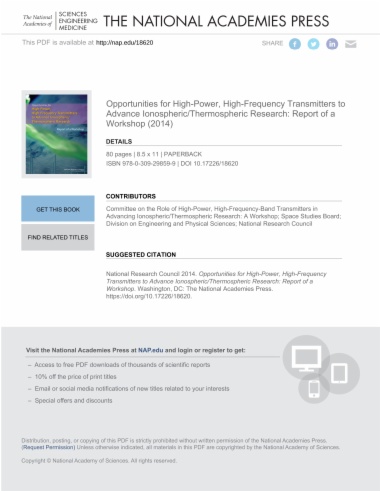

Opportunities for High-Power, High-Frequency Transmitters to Advance Ionospheric/Thermospheric Research is the summary of a workshop convened by the Space Studies Board of the National Research Council in May 2013. The request for this workshop was informed by the sponsors' awareness of the possibility that tight budgets would result in the Department of Defense's curtailment or even termination1 of support for the High Frequency Active Auroral Research Program (HAARP), which includes the world's highest-power and most capable high-frequency transmitter - "heater" - for ionospheric research. Although the workshop was organized to consider the utility of heaters in upper atmospheric research in general, it had a specific focus on the HAARP transmitter facility, which is located in a remote part of southeastern Alaska.
Research conducted by the ionospheric modifications community - a community that uses high-frequency transmitters to inject energy in the ionosphere and measure its effects using ground and space-based diagnostics - is focused on understanding the interaction of radio waves with the ionospheric plasma, the local consequences of heating in the ionosphere, and studies of non-linear plasma physics processes. The workshop provided a forum for information exchange between the comparatively small group of scientists engaged in programs of upper atmospheric research using high-power high-frequency radar transmitters and the larger ionospherethermosphere-magnetosphere research community.
This report examines the state of the art in active ionospheric and thermospheric research; considers the fundamental research areas in ionospheric science that can be addressed using high-power high-frequency-band transmitters; discusses emerging science questions that might benefit from active ionospheric experiments in the sub-auroral zone; and considers ways to combine similar facilities to perform global ionospheric science. The report also examines research opportunities that might arise from the relocation of the AMISR incoherent scatter radar from the Poker Flat Research Facility in Poker Flat, AK to Gakona, AK, the location of the HAARP facility.